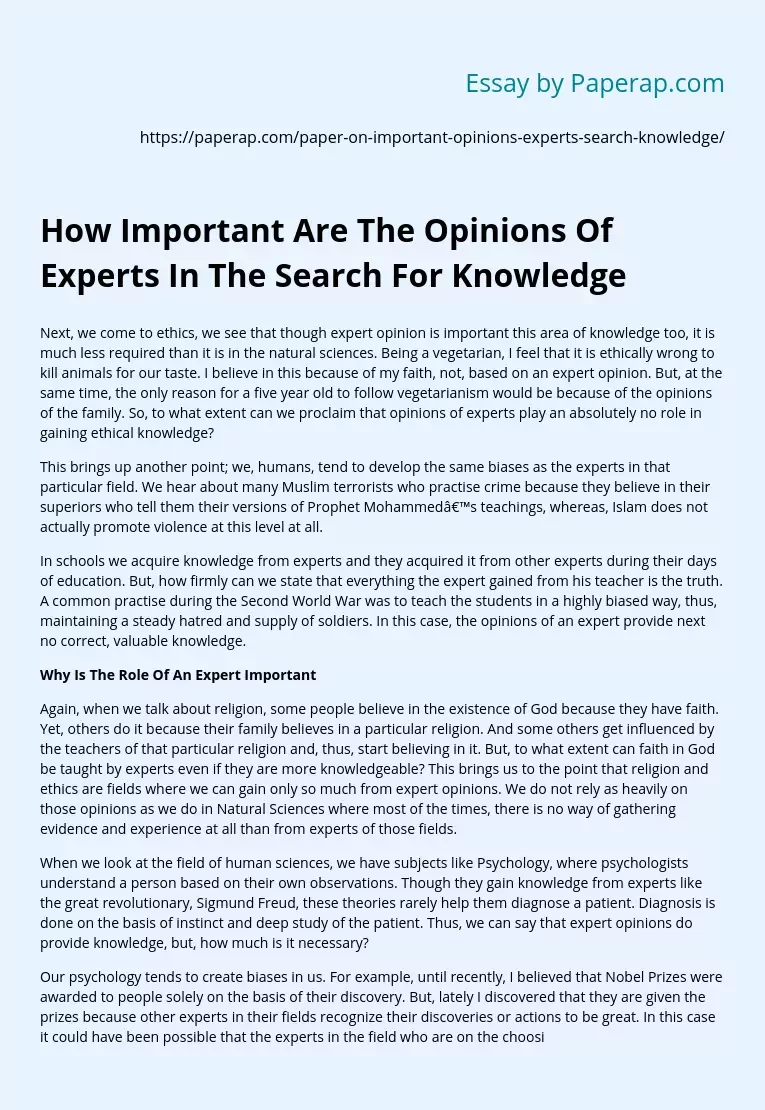How Important Are The Opinions Of Experts In The Search For Knowledge
Next, we come to ethics, we see that though expert opinion is important this area of knowledge too, it is much less required than it is in the natural sciences. Being a vegetarian, I feel that it is ethically wrong to kill animals for our taste. I believe in this because of my faith, not, based on an expert opinion. But, at the same time, the only reason for a five year old to follow vegetarianism would be because of the opinions of the family.
So, to what extent can we proclaim that opinions of experts play an absolutely no role in gaining ethical knowledge?
This brings up another point; we, humans, tend to develop the same biases as the experts in that particular field. We hear about many Muslim terrorists who practise crime because they believe in their superiors who tell them their versions of Prophet Mohammed’s teachings, whereas, Islam does not actually promote violence at this level at all.
In schools we acquire knowledge from experts and they acquired it from other experts during their days of education. But, how firmly can we state that everything the expert gained from his teacher is the truth. A common practise during the Second World War was to teach the students in a highly biased way, thus, maintaining a steady hatred and supply of soldiers. In this case, the opinions of an expert provide next no correct, valuable knowledge.
Why Is The Role Of An Expert Important
Again, when we talk about religion, some people believe in the existence of God because they have faith.
Yet, others do it because their family believes in a particular religion. And some others get influenced by the teachers of that particular religion and, thus, start believing in it. But, to what extent can faith in God be taught by experts even if they are more knowledgeable? This brings us to the point that religion and ethics are fields where we can gain only so much from expert opinions. We do not rely as heavily on those opinions as we do in Natural Sciences where most of the times, there is no way of gathering evidence and experience at all than from experts of those fields.
When we look at the field of human sciences, we have subjects like Psychology, where psychologists understand a person based on their own observations. Though they gain knowledge from experts like the great revolutionary, Sigmund Freud, these theories rarely help them diagnose a patient. Diagnosis is done on the basis of instinct and deep study of the patient. Thus, we can say that expert opinions do provide knowledge, but, how much is it necessary?
Our psychology tends to create biases in us. For example, until recently, I believed that Nobel Prizes were awarded to people solely on the basis of their discovery. But, lately I discovered that they are given the prizes because other experts in their fields recognize their discoveries or actions to be great. In this case it could have been possible that the experts in the field who are on the choosing committee knew the person from before, thus, automatically creating a bias. This example brings up the fact that we rely on authority to a very large extent. So much so that we blindly accept the opinions of experts which provide us with wrong knowledge a lot of times.
But, when we look at History as an area of knowledge, we have very less scope of gaining knowledge without the help of expert opinions. Even if we excavate the ruins of a place, we need an expert to decipher the society and the culture of the place. Thus, history is very vulnerable to being presented as wrong knowledge. This is so because many other things come in to play a role, such as, the bias of the expert, the language and communication of both the historical evidence and the expert.
Giving importance to expert opinions is crucial because they are the people who initiate paradigm shifts in their subjects. They may be biased and at fault many times, but, they provide us a platform to take off from. In conclusion, I felt that there is very heavy reliance on expert opinions in the field of natural sciences and comparatively less in human sciences and even lesser in ethics. Most of the knowledge that we have gained as a species has been in the last three centuries. It is not possible for any human to discover all this in one lifetime. And it is a well known fact that every bird needs a platform from where it takes off to fly. Thus, we need to rely upon the opinions of experts to a large extent, at the same time, keeping an open mind to change.
How Important Are The Opinions Of Experts In The Search For Knowledge. (2019, Dec 05). Retrieved from https://paperap.com/paper-on-important-opinions-experts-search-knowledge/

